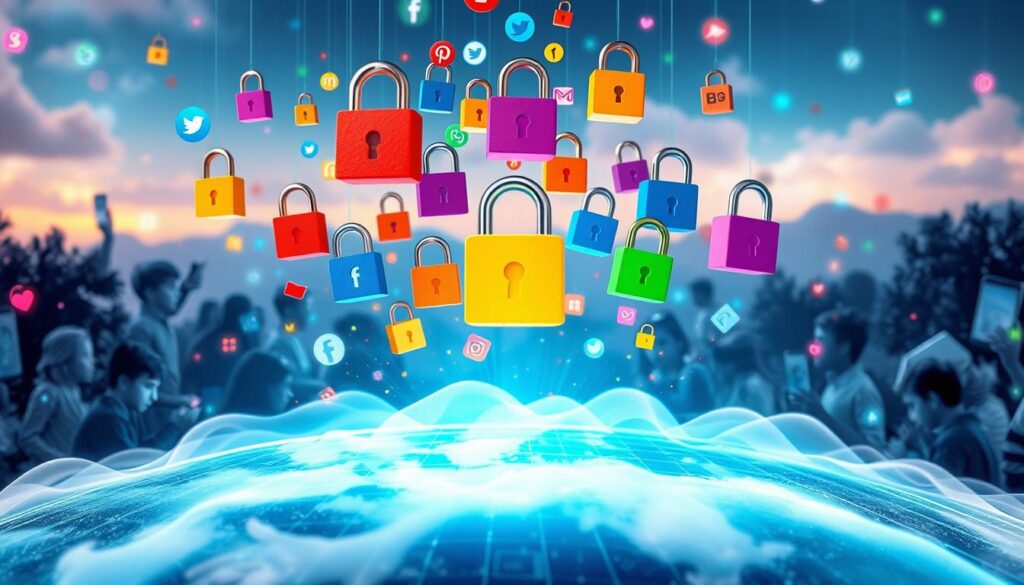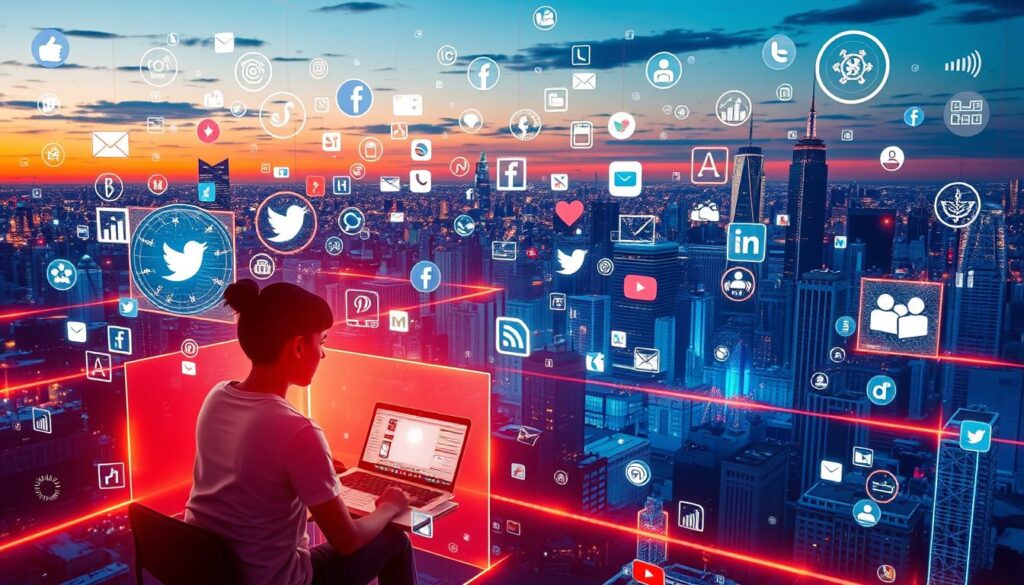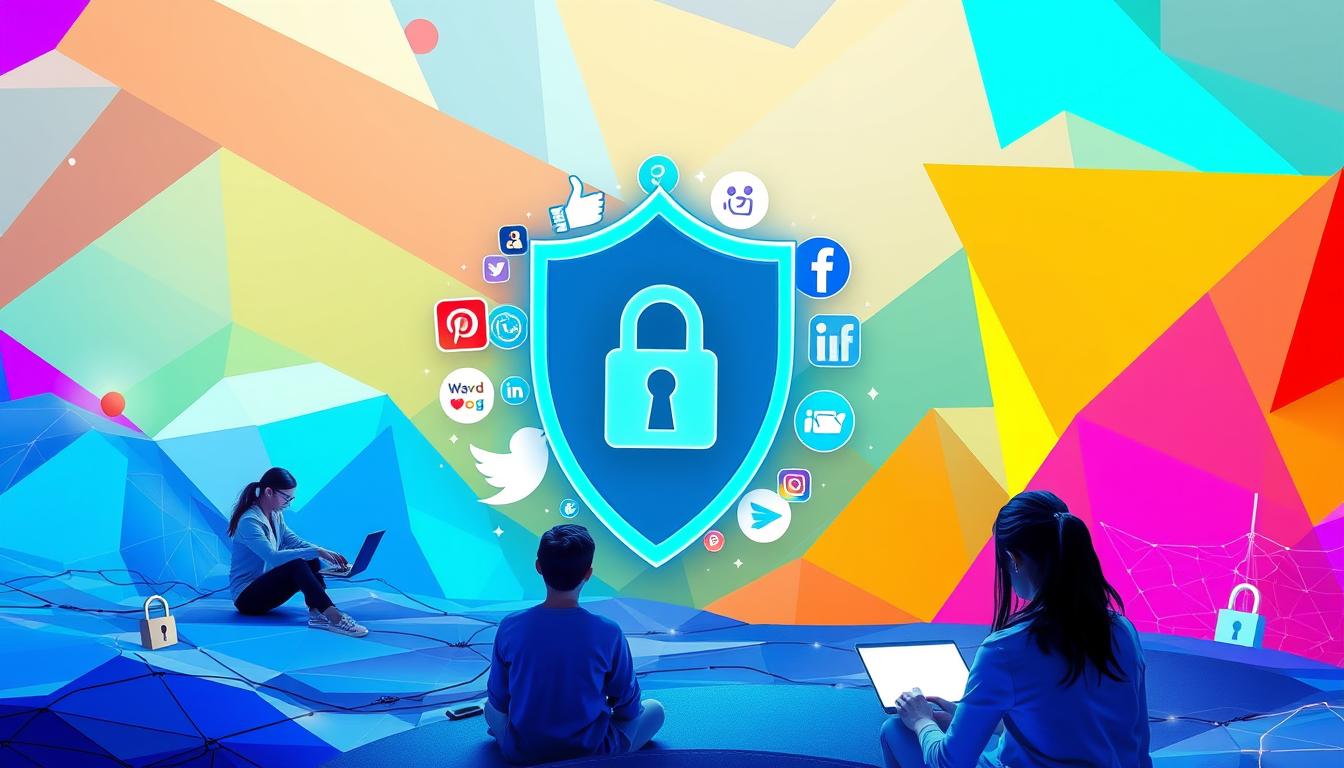The Federal Government has announced a new law. It bans kids under 16 from using social media. This move aims to tackle growing worries about young people’s mental health.
Studies show that teens who spend over three hours a day on social media are at higher risk. They face double the chance of depression, anxiety, and even thinking about suicide.
This new bill is going to the Senate. It wants to protect young users from the dangers of too much social media. Lawmakers plan to set age limits and improve parental controls. They hope to reduce cyberbullying, digital addiction, and the negative effects on schoolwork and overall health.
Key Takeaways
- Federal legislation banning children under 16 from using social media platforms
- Concerns over the impact of social media on youth mental health and well-being
- Measures to include parental controls, screen time limits, and cyberbullying prevention
- Aims to address the complex relationship between social media and adolescent development
- Importance of protecting young users in the digital age
Understanding the Impact of Social Media on Youth Mental Health
Social media is everywhere, and it’s making young people worry about their mental health. The U.S. Surgeon General, Vivek Murthy, wants warning labels on social media. He believes this will help protect young minds.
Research Findings on Mental Health Outcomes
Studies show social media’s effect on young people is mixed. Some say it helps kids like children of color and LGBTQ+ youth by giving them support. But, the CDC found more young people feeling sad, hopeless, and thinking about suicide.
Academic Performance Concerns
Social media is also affecting how well kids do in school. A study showed 89% of teachers think it hurts kids’ reading skills. The Senate is working on laws to help fix these problems.
Screen Time and Behavioral Changes
Too much screen time and social media can cause bad behavior. It can make kids take more risks and even get hurt. As digital life grows, teaching kids how to use it wisely is more important than ever.
“The business models of social media platforms, which rely on keeping users engaged for as long as possible, pose real risks to the mental health and well-being of young people.”
– Jenny Radesky, American Academy of Pediatrics
Legal Framework and Enforcement Mechanisms
The federal government plans to test age verification technology next year to protect child safety online. This move will make social media companies more responsible. They will have to stop under-16s from using their sites. Laws are being made to enforce this, with increased penalties for those who don’t comply.
Age Verification Requirements
The Kids Online Safety Act (KOSA) will soon require social media companies to take care of kids’ safety. They must prevent harm, block addictive content, and limit how long kids can use their sites. KOSA will also let kids choose not to see personalized ads and limit who can talk to them online.
Platform Responsibilities and Penalties
Social media sites will have to do more to keep young users safe and private. If they don’t follow the rules, they’ll face severe penalties. This shows a strong effort to fight social media addiction and internet safety problems among kids.
Parental Control Measures
Parents play a big role in keeping kids safe online. The laws will require better parental control measures. These tools will help families watch and manage their kids’ online activities. This way, parents can help their kids stay safe and healthy online.
This legal plan aims to create a safer digital world for kids. It’s designed to protect their interests and ensure a healthier online future for them.

Benefits and Risks of Social Media for Young Users
Social media is a big part of young people’s lives, with both good and bad sides. Sites like Instagram, Snapchat, and TikTok help kids feel connected. They offer a place for self-expression and finding support.
But, social media can also harm young minds. Seeing perfect images can make kids feel bad about themselves. Algorithmically driven content, endless notifications, and being anonymous online can cause anxiety and depression.
Experts are trying to figure out how social media affects mental health. The American Academy of Pediatrics suggests warning labels on social media to help families set limits.
The debate on social media’s impact on young users goes on. Some think age limits could hurt kids who need social media for support. Others want better safety measures to protect kids from online bullying, digital wellness threats, and online predators.
“More research is needed to determine the causal effect of social media use on negative youth mental health, particularlly concerning how children’s moods are influenced by their platform usage.”

Platform Safety Features and Protective Measures
Many social media platforms have safety features to protect young users. They use content moderation tools to remove harmful content. Privacy settings for minors also limit who can see their posts and who they can interact with. Algorithmic systems try to show content that’s right for their age and avoid harmful stuff.
Content Moderation Tools
Platforms like TikTok, Snapchat, and Instagram use advanced tools to find and remove bad content. These tools use both machines and humans to check posts for things like hate speech and self-harm. But, how well these tools work is something people keep talking about.
Privacy Settings for Minors
Platforms have made privacy settings better for kids. For example, Instagram makes profiles of users under 16 (or 18 in some places) private by default. This means only approved friends can see their posts. They also stop adults from sending direct messages to kids, helping keep them safe from predators.
Algorithmic Content Control
Social media platforms use algorithms to show content that’s right for young users. These algorithms try to show content that’s interesting and safe for their age. But, some people worry about how well these systems work and how transparent they are.
FAQ
What is the new legislation banning children under 16 from social media?
The Federal Government has introduced a law to keep kids under 16 off social media. This move is to help with youth mental health issues. The bill is now on its way to the Senate to protect young users online.
What are the mental health and academic impacts of social media use among children and teens?
Kids and teens spending over three hours a day on social media face a higher risk of poor mental health. Studies show that more social media use can hurt school grades. In fact, 89% of teachers say it harms reading skills.
How will the new legislation be enforced, and what are the platform responsibilities?
The Federal Government will test new tech to verify ages next year. Social media companies must ensure only those over 16 can use their platforms. They will face harsher penalties if they don’t follow these rules.
What are the potentially positive and negative effects of social media on young users?
Social media can help kids feel less alone, giving them a sense of belonging. It can also harm self-esteem through body comparisons. The impact of social media on young minds is complex, with both good and bad sides.
What safety features and protective measures are social media platforms implementing?
Most platforms require users to be at least 13 and have safety features like blocking adult messages. They also set privacy settings as default for minors. But, more is needed to tackle the mental health effects of social media.
Source Links
- Social Media Bans Could Deny Teenagers Mental Health Help – KFF Health News
- Australia plans a social media ban for children under 16
- Australia plans a social media ban for children under 16
- Social media bans could magnify mental health challenges for teens • Daily Montanan
- Impact of Social Media on Youth
- Social media brings benefits and risks to teens. Psychology can help identify a path forward
- What Should Policymakers Do about Social Media and Minors?
- Protecting Teens From Big Tech: Five Policy Ideas for States
- How to Address Children’s Online Safety in the United States
- Social media benefits and risks: pre-teens and teenagers
- A Possible Downside to Limits on Teens’ Access to Social Media – KFF Health News
- Keeping children safe on social media: What parents should know to protect their kids
- Keeping teens safe on social media: What parents should know to protect their kids
- Keeping children safe on social media: What parents should know to protect their kids



